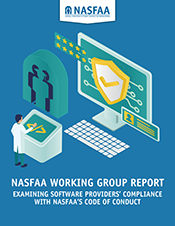Examining Software Providers' Compliance With the NASFAA Code of Conduct Report
 NASFAA convened the Examining Software Providers' Compliance With the NASFAA Code of Conduct Working Group in September 2019 to research and analyze the role that student financial aid management software plays in institutions' ability to provide accurate and clear aid offers. The group was tasked with examining software providers' ability and willingness to adapt to changes in the landscape of aid offers initiated by institutions, associations, or Congress, as well as the ease with which institutions' software allows them to comply with NASFAA's Code of Conduct.
NASFAA convened the Examining Software Providers' Compliance With the NASFAA Code of Conduct Working Group in September 2019 to research and analyze the role that student financial aid management software plays in institutions' ability to provide accurate and clear aid offers. The group was tasked with examining software providers' ability and willingness to adapt to changes in the landscape of aid offers initiated by institutions, associations, or Congress, as well as the ease with which institutions' software allows them to comply with NASFAA's Code of Conduct.
The working group comprised a geographically diverse group of seven NASFAA members from all postsecondary institutional sectors, with a particular emphasis on the inclusion of members from schools who represent users of as many financial aid management systems as possible, including homegrown systems. The group conducted its work between September 2019 and January 2020, and its recommendations were accepted and approved by the NASFAA Board of Directors in May 2020.
Based on the research and discussions the working group developed, the NASFAA Board accepted and endorsed the full set of recommendations detailed in this report. The working group came up with 16 recommendations and best practices, which were divided into four different sections: recommendations for Congress, recommendations for NASFAA, best practices for software providers, and best practices for institutions. By organizing its report in this way, the working group hoped to show that improving financial aid offers is a shared responsibility that involves collaboration between multiple stakeholders.
Highlights of the report's recommendations/best practices include:
- Congress should pass legislation that requires institutional aid offers to include standardized terminology, definitions, and core elements, including a breakdown of individual components of the institution's cost of attendance (COA), clear identification of aid type, and renewal requirements.
- NASFAA should hold a convening of representatives from major software providers used by member institutions, NASFAA staff, and members of the financial aid community who represent a wide demographic of students with diverse needs.
- Software providers should create financial aid management systems that can be used to develop custom aid offers that comply with NASFAA's Code of Conduct and meet the needs of diverse institutions and unique student populations, such as graduate, undergraduate, nontraditional, first-generation, professional, and distance education students.
- Software providers should ensure that their "base package" of financial aid offer software includes all the tools needed to comply with NASFAA's Code of Conduct as well as is an affordable and financially reasonable option for institutions.
- Financial aid offices should collaborate with all relevant departments across their institutions (e.g. admissions, financial aid, business office, registrar, scholarship, academic departments) to create campus-wide awareness about the following items:
-
- The obligation, as aid administrators, to coordinate all aid on campus.
- The importance of scholarship information being communicated to the financial aid office consistently within the same timeframe.
- The importance of avoiding sending multiple, disjointed financial aid communications as students become eligible for new aid sources.
- The importance of ensuring that information regarding aid or scholarship offers, and their deadlines or renewal requirements, are consistent among all offices involved.
- The importance of ensuring cost transparency for students by agreeing on a uniform approach across campus that aid amounts are presented in the same time frame, i.e. amount by semester, year, or in four-year increments.
- A financial aid office-focused calendar that ensures all applicable departments are aware of deadlines if they want to guarantee all aid available to prospective students is in the initial offer of financial aid.
Publication Date: 5/26/2020



